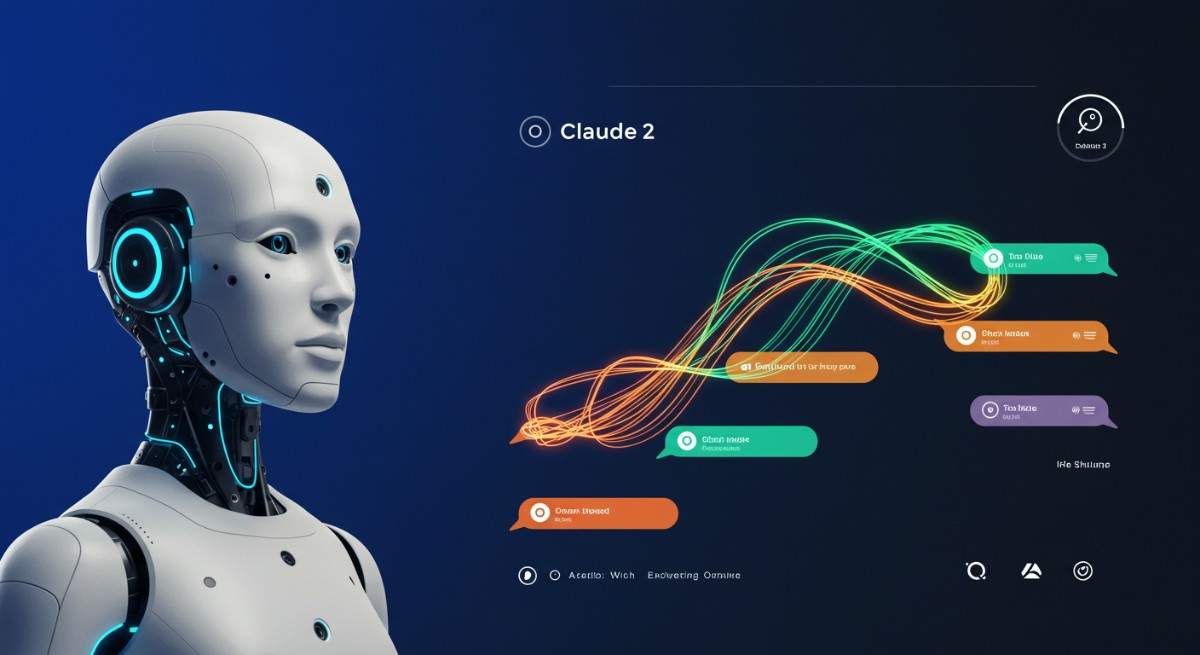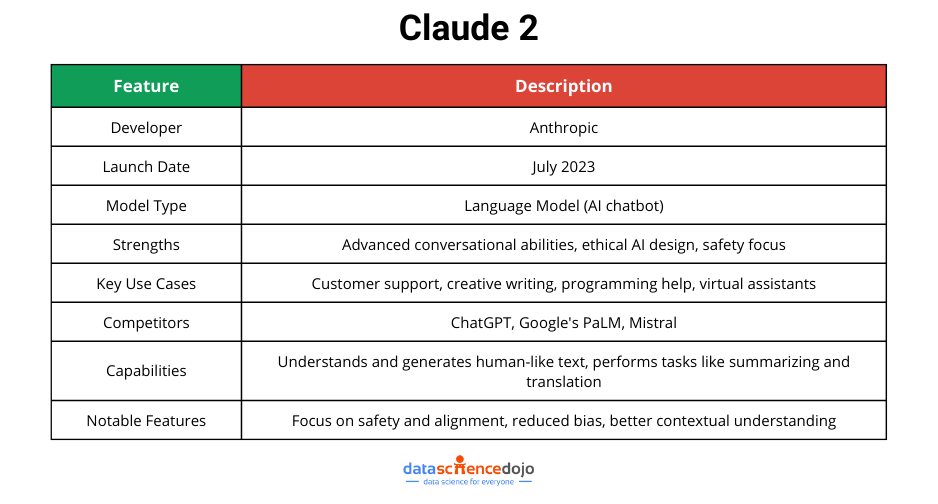Anthropic, a leading artificial intelligence research company, recently launched Claude 2, a groundbreaking language model that aims to redefine the landscape of natural language processing and human-computer interactions.
Claude 2 is shaking things up in the chatbot world. It is a promising new chatbot that has the potential to rival ChatGPT. It is still under development, but it has already learned to perform many kinds of tasks. If you are looking for a chatbot that is both informative and creative, then it is worth a try. It is still under development, but it has already learned to perform many kinds of tasks, including:
- Following instructions and completing requests thoughtfully.
- Answering questions in a comprehensive and informative way, even if they are open ended, challenging, or strange.
- Generating different creative text formats of text content, like poems, code, scripts, musical pieces, email, letters, etc.
Claude 2 vs Claude
Claude 2 and Claude are both large language models (LLMs) developed by Anthropic. However, there are some key differences between the two models. It is a newer model, and it has been trained on a larger dataset of text and code. This means that it has a better understanding of context and can generate more accurate and relevant responses to user queries. Additionally, it has been fine-tuned to be more ethical, which means that it is less likely to generate biased or offensive content.
| Feature | Claude 2 | Claude |
|---|---|---|
| Model size | 137 billion parameters | 93 billion parameters |
| Training dataset | Text and code | Text |
| Context understanding | Better | Worse |
| Accuracy | More accurate | Less accurate |
| Relevance | More relevant | Less relevant |
| Ethics | More ethical | Less ethical |
Claude is an older model, but it is still a powerful language model. It has been trained on a large dataset of text, and it can generate human-like text in response to a wide range of prompts. However, Claude does not have the same understanding of context as Claude 2, and it is more likely to generate inaccurate or irrelevant responses. Additionally, Claude has not been fine-tuned to be as ethical, so it is more likely to generate biased or offensive content.
Introducing Claude 2:
Claude 2 is a direct competitor to OpenAI’s ChatGPT, and it promises to take the experience of conversational AI to a whole new level. One of the key differentiators is its advanced understanding of context. The model has been trained on an extensive dataset of text and code, allowing it to grasp complex nuances and respond more accurately to user queries. It can effortlessly comprehend and generate human-like responses, creating a seamless conversation that closely resembles interacting with a real person.
Advanced Understanding of Context
Claude 2 has been trained on an extensive dataset of text and code, which allows it to grasp complex nuances and respond more accurately to user queries. For example, if a user asks “What is the weather like in Paris today?”, the new AI platform will not only be able to provide the current temperature, but it will also be able to take into account the user’s location and preferences. This ensures that it is able to provide relevant and helpful information, even in complex or ambiguous situations.
Read more –> ChatGPT vs Bard: Which AI chatbot is right for you?
Ethical Approach
The dataset that Claude 2 was trained on was carefully curated to avoid biases. This ensures that the new platform is able to provide unbiased and objective information, fostering a more inclusive and reliable AI experience. For example, if a user asks “What are the best restaurants in New York City?”It will not be influenced by the user’s race, gender, or sexual orientation. It will simply provide a list of the top-rated restaurants in New York City, regardless of who is asking the question.
Adaptability
This Anthropic’s latest model can easily be fine-tuned to suit specific domains, making it a versatile tool for various industries. For example, it could be used to provide customer support, generate marketing copy, or even write code. This makes it a valuable asset for businesses that are looking to improve their customer service, marketing, or product development processes.
Enhanced Multi-Modal Capabilities
One of the standout features of Claude 2 is its enhanced multi-modal capabilities, which sets it apart from its predecessor and many other AI models in the market. While Claude was primarily focused on text-based interactions, the latest model takes a significant leap forward by integrating the ability to process and understand multiple types of input, including text, images, and potentially audio.
This multi-modal functionality allows Claude 2 to provide more dynamic and contextually aware responses across a variety of applications. For example, in industries such as healthcare or design, where visual data plays a critical role, Claude 2 can analyze and respond to images, diagrams, and charts in addition to text-based queries. This makes it an invaluable tool for sectors requiring more comprehensive, cross-platform interaction.
Impact of Claude 2
- Intensifies competition in the conversational AI space: It is a major technological achievement, and its launch is sure to intensify competition in the conversational AI space. Other language models, such as OpenAI’s ChatGPT, will need to innovate in order to keep up with its capabilities. This is good news for consumers, as it means that they will have access to better and more sophisticated conversational AI systems.
- Presents exciting opportunities for developers and businesses: It is also a valuable tool for developers and businesses. The model’s advanced understanding of context and ethical approach make it ideal for a variety of applications, such as customer service, marketing, and product development. Developers can easily fine-tune it to suit their specific needs, and businesses can use it to improve their customer experience and product offerings.
- Drives innovation and pushes the boundaries of AI-powered conversational systems: It is not just a better conversational AI system than its predecessors. It is also a major technological breakthrough that has the potential to drive innovation and push the boundaries of AI-powered conversational systems. The model’s advanced capabilities could lead to new and innovative applications, such as AI-powered tutors, virtual assistants, and even chatbot therapists.
Why Comparing Claude 2 with Other AI Models Matters
As Claude 2 is an exciting advancement in AI technology, understanding its strengths and limitations in comparison to other popular models is essential. With a range of applications, from creative writing to coding and customer support, knowing which model excels in specific areas can help users choose the right one for their needs. In this context, we’ll explore how Claude 2 stacks up against models like GPT-4, Bard, and LLaMA—highlighting their unique capabilities and use cases.
Claude 2 vs Other Popular AI Models: A Comparative Analysis
| Feature | Claude 2 | GPT-4 | Bard (Google) | LLaMA (Meta) |
|---|---|---|---|---|
| Model Size | 137 billion parameters | 175 billion parameters | Unknown | 65 billion parameters |
| Training Data | Text and code | Text and diverse sources (e.g., web) | Web-based data and Google-specific sources | Publicly available datasets |
| Context Understanding | Excellent, highly context-aware | Strong, with a good understanding of context | Adequate, often struggles with deep context | Strong, tailored for research purposes |
| Ethical Considerations | High ethical safeguards, bias reduction | Moderate ethical safeguards, bias risk | Focused on neutrality and factuality | Minimal ethical fine-tuning |
| Versatility | Best for controlled and sensitive tasks | Very versatile across diverse use cases | Good for general information and queries | Primarily research-focused, less versatile |
| Creativity & Flexibility | Moderate, more precision-focused | High, excels in creative outputs | Good, with Google’s search engine integration | Moderate, focused on structured outputs |
| Use Cases | Customer support, sensitive content | Content generation, problem-solving, coding | General queries, Google ecosystem tasks | Research, academic purposes, AI research |
Each model offers unique strengths. Claude 2 is optimized for ethical use and contextual understanding, while GPT-4 shines in versatility and creativity. Bard excels in general queries, especially within the Google ecosystem, and LLaMA serves academic research needs. Selecting the right model depends on the task at hand, whether it’s creative content generation, ethical content handling, or research-driven applications.
Conclusion
In conclusion, Claude 2 represents a significant step forward in the world of AI and natural language processing. With its unique blend of advanced capabilities, safety features, and accessibility, it is poised to become an essential tool for various industries. Whether you’re leveraging this model for data analysis, creative projects, or enhancing customer experiences, its adaptability and reliability make it a powerful resource. As AI continues to evolve, such tools will undoubtedly play a pivotal role in shaping the future of technology and innovation.





